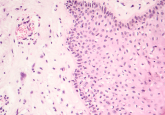Novel biosensor design may mean rapid and accurate results in point-of-care serum analysis

A new field-effect transistor (FET)-based biosensor may be able to overcome the issues associated with central laboratory analyzers, providing rapid and accurate diagnoses on a serum sample without complex and time-consuming protocols involved in sample preparation and analysis.
Research published in ACS Sensors describe a novel strategy to combat the high ionic strength of serum, which has previously been found to mask or disguise the electric fields from target compounds such as proteins and DNA, necessary for detection in previous biosensor testing and analysis.
By functionalizing the detection surface with biological receptors and a polymer polyethylene glycol on a gold base, the team enhanced the sensor response. With this advance, they may be the first to demonstrate direct immunodetection in whole serum using FET-based biosensors, without the complex and time-consuming steps associated with current methods of serum analysis.
Further benefits of the biosensor include how economical the device is, allowing mass production and supply to meet market demand. The devices are also portable and therefore suitable for point-of-care diagnoses.
Researchers tested the sensor with human thyroid-stimulating hormone, finding that they could detect the hormone at subpicomolar concentrations when tested at elevated temperatures of 37°C. This is well below previously recognized limits for FETs, and can reportedly be modified to diagnose many conditions, illnesses and disorders rapidly and economically.
Source: Gutiérrez-Sanz Ó, Andoy NM, Filipiak MS, Haustein N, Tarasov A. Direct, Label-Free, and Rapid Transistor-Based Immunodetection in Whole Serum. ACS Sens. doi: 10.1021/acssensors.7b00187 (2017)(Epub ahead of print); https://www.eurekalert.org/pub_releases/2017-08/acs-bch082517.php




